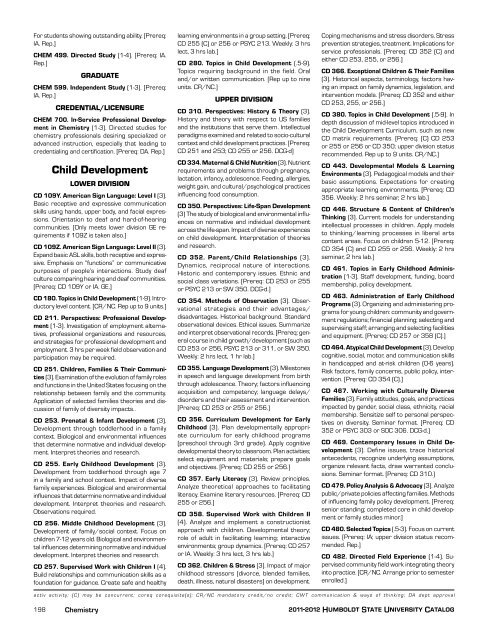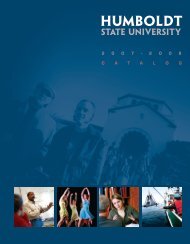2011-12 Academic Year - Bad Request - Humboldt State University
2011-12 Academic Year - Bad Request - Humboldt State University
2011-12 Academic Year - Bad Request - Humboldt State University
You also want an ePaper? Increase the reach of your titles
YUMPU automatically turns print PDFs into web optimized ePapers that Google loves.
For students showing outstanding ability. [Prereq:<br />
IA. Rep.]<br />
CHEM 499. Directed Study (1-4). [Prereq: IA.<br />
Rep.]<br />
GRADUATE<br />
CHEM 599. Independent Study (1-3). [Prereq:<br />
IA. Rep.]<br />
CREDENTIAL/LICENSURE<br />
CHEM 700. In-Service Professional Devel opment<br />
in Chemistry (1-3). Directed studies for<br />
chemistry professionals desiring specialized or<br />
advanced instruction, especially that leading to<br />
credentialing and certification. [Prereq: DA. Rep.]<br />
Child Development<br />
LOWER DIVISION<br />
CD 109Y. American Sign Language: Level I (3).<br />
Basic receptive and expressive communication<br />
skills using hands, upper body, and facial expressions.<br />
Orientation to deaf and hard-of-hearing<br />
communities. [Only meets lower division GE requirements<br />
if 109Z is taken also.]<br />
CD 109Z. American Sign Language: Level II (3).<br />
Expand basic ASL skills, both receptive and expressive.<br />
Emphasis on “functions” or communicative<br />
purposes of people’s interactions. Study deaf<br />
culture comparing hearing and deaf communities.<br />
[Prereq: CD 109Y or IA. GE.]<br />
CD 180. Topics in Child Development (1-9). Introductory<br />
level content. [CR/NC. Rep up to 9 units.]<br />
CD 211. Perspectives: Professional Development<br />
(1-3). Investigation of employment alternatives,<br />
professional organizations and resources,<br />
and strategies for professional development and<br />
employment. 3 hrs per week field observation and<br />
participation may be required.<br />
CD 251. Children, Families & Their Communities<br />
(3). Examination of the evolution of family roles<br />
and functions in the United <strong>State</strong>s focusing on the<br />
relationship between family and the community.<br />
Application of selected families theories and discussion<br />
of family of diversity impacts..<br />
CD 253. Prenatal & Infant Development (3).<br />
Development through toddlerhood in a family<br />
context. Biological and environmental influences<br />
that determine normative and individual development.<br />
Interpret theories and research.<br />
CD 255. Early Childhood Development (3).<br />
De velopment from toddlerhood through age 7<br />
in a family and school context. Impact of diverse<br />
family experiences. Biological and environmental<br />
influences that determine normative and individual<br />
development. Interpret theories and research.<br />
Observations required.<br />
CD 256. Middle Childhood Development (3).<br />
Development of family/social context. Focus on<br />
children 7-<strong>12</strong> years old. Biological and environmental<br />
influences determining normative and individual<br />
development. Interpret theories and research.<br />
CD 257. Supervised Work with Children I (4).<br />
Build relationships and communication skills as a<br />
foundation for guidance. Create safe and healthy<br />
learning environments in a group setting. [Prereq:<br />
CD 255 (C) or 256 or PSYC 213. Weekly: 3 hrs<br />
lect, 3 hrs lab.]<br />
CD 280. Topics in Child Development (.5-9).<br />
Topics requiring background in the field. Oral<br />
and/or written communication. [Rep up to nine<br />
units. CR/NC.]<br />
UPPER DIVISION<br />
CD 310. Perspectives: History & Theory (3).<br />
History and theory with respect to US families<br />
and the institutions that serve them. Intellectual<br />
paradigms examined and related to socio-cultural<br />
context and child development practices. [Prereq:<br />
CD 251 and 253; CD 255 or 256. DCG-d]<br />
CD 334. Maternal & Child Nutrition (3). Nutrient<br />
requirements and problems through pregnancy,<br />
lactation, infancy, adolescence. Feeding, allergies,<br />
weight gain, and cultural/psychologi cal practices<br />
influencing food consumption.<br />
CD 350. Perspectives: Life-Span Development<br />
(3) The study of biological and environmental influences<br />
on normative and individual development<br />
across the life-span. Impact of diverse experiences<br />
on child development. Interpretation of theories<br />
and research.<br />
CD 352. Parent/Child Relationships (3).<br />
Dynamics, reciprocal nature of interactions.<br />
Historic and contemporary issues. Ethnic and<br />
social class variations. [Prereq: CD 253 or 255<br />
or PSYC 213 or SW 350. DCG-d.]<br />
CD 354. Methods of Observation (3). Observational<br />
strategies and their advantages/<br />
disad vantages. Historical background. Standard<br />
obser vational devices. Ethical issues. Summarize<br />
and interpret observational records. [Prereq: general<br />
course in child growth/development (such as<br />
CD 253 or 256, PSYC 213 or 311, or SW 350.<br />
Week ly: 2 hrs lect, 1 hr lab.]<br />
CD 355. Language Development (3). Milestones<br />
in speech and language development from birth<br />
through adolescence. Theory; factors influencing<br />
acquisition and competency; language delays/<br />
disorders and their assessment and intervention.<br />
[Prereq: CD 253 or 255 or 256.]<br />
CD 356. Curriculum Development for Early<br />
Childhood (3). Plan developmentally appropriate<br />
curriculum for early childhood programs<br />
(preschool through 3rd grade). Apply cognitive<br />
de velopmental theory to classroom. Plan activities;<br />
select equipment and materials; prepare goals<br />
and objectives. [Prereq: CD 255 or 256.]<br />
CD 357. Early Literacy (3). Review principles.<br />
Analyze theoretical approaches to facilitating<br />
literacy. Examine literary resources. [Prereq: CD<br />
255 or 256.]<br />
CD 358. Supervised Work with Children II<br />
(4). Analyze and implement a constructionist<br />
ap proach with children. Developmental theory;<br />
role of adult in facilitating learning; interactive<br />
environments; group dynamics. [Prereq: CD 257<br />
or IA. Weekly: 3 hrs lect, 3 hrs lab.]<br />
CD 362. Children & Stress (3). Impact of ma jor<br />
childhood stressors (divorce, blended families,<br />
death, illness, natural disasters) on development.<br />
Coping mechanisms and stress disorders. Stress<br />
prevention strategies, treatment. Implications for<br />
serv ice professionals. [Prereq: CD 352 (C) and<br />
either CD 253, 255, or 256.]<br />
CD 366. Exceptional Children & Their Families<br />
(3). Historical aspects, terminology, factors having<br />
an impact on family dynamics, legislation, and<br />
intervention models. [Prereq: CD 352 and either<br />
CD 253, 255, or 256.]<br />
CD 380. Topics in Child Development (.5-9). In<br />
depth discussion of mid-level topics introduced in<br />
the Child Development Curriculum, such as new<br />
CD matrix requirements. [Prereq: (C) CD 253<br />
or 255 or 256 or CD 350; upper division status<br />
recommended. Rep up to 9 units. CR/NC.]<br />
CD 443. Developmental Models & Learning<br />
Environments (3). Pedagogical models and their<br />
basic assumptions. Expectations for creat ing<br />
appropriate learning environments. [Prereq: CD<br />
356. Weekly: 2 hrs seminar, 2 hrs lab.]<br />
CD 446. Structure & Content of Chil dren’s<br />
Thinking (3). Current models for understanding<br />
intellectual processes in children. Apply models<br />
to thinking/learning processes in liberal arts<br />
content areas. Focus on children 5-<strong>12</strong>. [Prereq:<br />
CD 354 (C) and CD 255 or 256. Weekly: 2 hrs<br />
seminar, 2 hrs lab.]<br />
CD 461. Topics in Early Childhood Administration<br />
(1-3). Staff de velopment, funding, board<br />
membership, policy development.<br />
CD 463. Administration of Early Childhood<br />
Programs (3). Organizing and administering programs<br />
for young children: community and government<br />
regulations; financial planning; selecting and<br />
supervising staff; arranging and selecting facilities<br />
and equipment. [Prereq: CD 257 or 358 (C).]<br />
CD 464. Atypical Child Development (3). Devel op<br />
cognitive, social, motor, and communication skills<br />
in handicapped and at-risk children (0-6 years).<br />
Risk factors, family concerns, public policy, intervention.<br />
[Prereq: CD 354 (C).]<br />
CD 467. Working with Culturally Diverse<br />
Families (3). Family attitudes, goals, and practices<br />
impacted by gender, social class, ethnicity, racial<br />
membership. Sensitize self to personal perspectives<br />
on diversity. Seminar format. [Prereq: CD<br />
352 or PSYC 303 or SOC 306. DCG-d.]<br />
CD 469. Contemporary Issues in Child Development<br />
(3). Define issues, trace historical<br />
antecedents, recognize underlying assumptions,<br />
organize relevant facts, draw warranted conclusions.<br />
Seminar format. [Prereq: CD 310.]<br />
CD 479. Policy Analysis & Advocacy (3). Analyze<br />
public/private policies affecting families. Methods<br />
of influencing family policy development. [Prereq:<br />
senior standing; completed core in child development<br />
or family studies minor.]<br />
CD 480. Selected Topics (.5-3). Focus on current<br />
issues. [Prereq: IA; upper division status recommended.<br />
Rep.]<br />
CD 482. Directed Field Experience (1-4). Supervised<br />
community field work integrating theory<br />
into practice. [CR/NC. Arrange prior to semester<br />
enrolled.]<br />
activ activity; (C) may be concurrent; coreq corequisite(s); CR/NC mandatory credit/no credit; CWT communication & ways of thinking; DA dept approval<br />
198 Chemistry<br />
<strong>2011</strong>-20<strong>12</strong> <strong>Humboldt</strong> <strong>State</strong> <strong>University</strong> Catalog

















